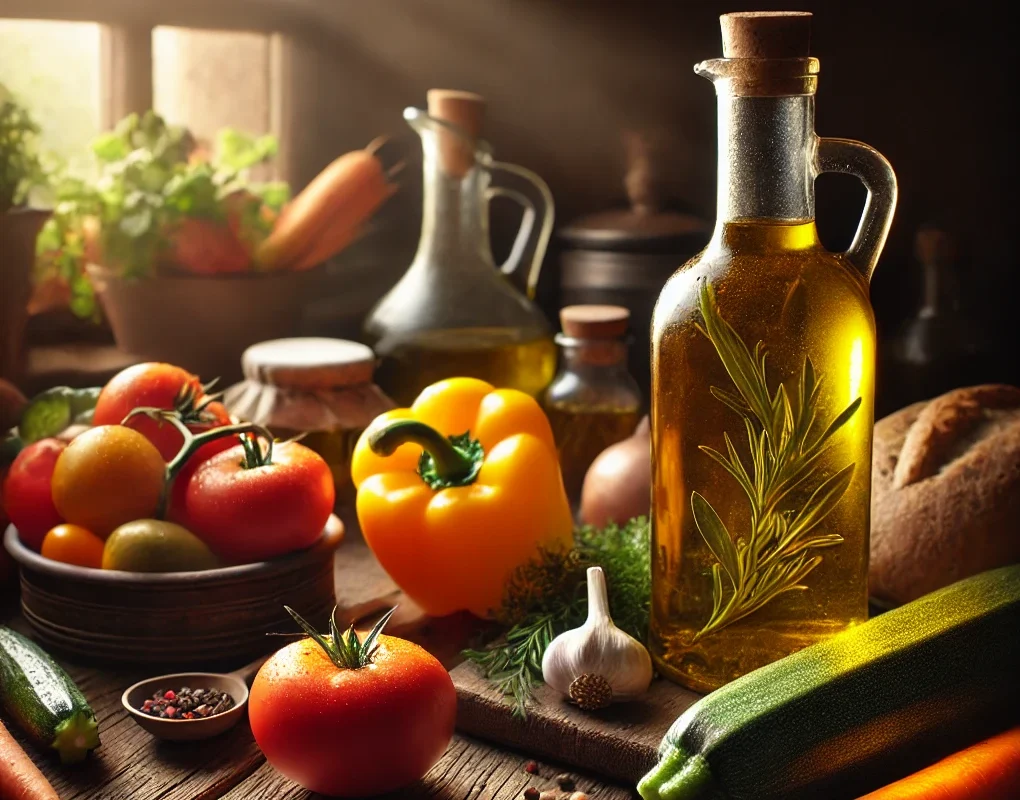Olive oil, often referred to as “liquid gold,” is a cornerstone of the Mediterranean diet and a staple in kitchens around the world. Renowned for its rich flavor and versatility, olive oil is not only a healthy cooking ingredient but also offers numerous health benefits. Packed with monounsaturated fats, antioxidants, and anti-inflammatory properties, olive oil supports heart health, skin care, and overall well-being.
Health Benefits of Olive Oil
Heart Health: Olive oil is rich in monounsaturated fats, particularly oleic acid, which is associated with reduced risk of heart disease. It can help lower LDL (bad) cholesterol levels while increasing HDL (good) cholesterol levels.
Antioxidant Properties: Extra virgin olive oil is high in antioxidants, including vitamin E and polyphenols, which help protect the body from oxidative stress and inflammation.
Anti-Inflammatory Effects: The polyphenols in olive oil have anti-inflammatory properties, which may help reduce the risk of chronic diseases associated with inflammation, such as arthritis and heart disease.
Weight Management: Some studies suggest that incorporating olive oil into a balanced diet may help with weight management and fat loss, particularly when used in place of saturated fats.
Cognitive Health: Research indicates that olive oil may have protective effects on brain health and may reduce the risk of cognitive decline and neurodegenerative diseases, such as Alzheimer’s disease.
Digestive Health: Olive oil may promote digestive health by supporting the production of bile and improving gut health. It can also help alleviate constipation.
Skin Health: Olive oil is often used in skincare products due to its moisturizing and antioxidant properties. It can help hydrate the skin and may have anti-aging effects.
Versatile Cooking Oil: Olive oil can be used in a variety of culinary applications, including sautéing, roasting, and salad dressings. Extra virgin olive oil is particularly valued for its flavor and health benefits.
Uses of Olive Oil
Salad Dressings: It serves as a base for salad dressings and marinades, adding flavor and healthy fats to salads and vegetables.
Dipping: Olive oil is often used as a dip for bread, sometimes combined with herbs, spices, or balsamic vinegar.
Baking: It can be used in baking recipes, providing moisture and flavor to cakes, breads, and pastries.
Health Supplement: Olive oil is a key component of the Mediterranean diet, which is associated with various health benefits, including heart health and reduced inflammation.
Skin Care: Olive oil can be used as a moisturizer for the skin and is sometimes included in homemade beauty products.
Hair Care: It can be applied to hair as a conditioner or treatment to enhance shine and manageability.
Considerations
Quality: The quality of olive oil varies significantly. Extra virgin olive oil is the highest quality, made from the first cold pressing of olives and retaining the most nutrients and flavor. Look for certifications or labels indicating quality.
Smoke Point: While olive oil has a relatively high smoke point (around 375-410°F or 190-210°C for EVOO), it is lower than some other oils like avocado or canola oil. It’s best to avoid using it for high-heat frying.
Storage: Olive oil should be stored in a cool, dark place to prevent oxidation and rancidity. Exposure to light and heat can degrade its quality.
Caloric Density: Like all oils, olive oil is calorie-dense, so portion control is important, especially for those monitoring their caloric intake.
Allergies: While rare, some individuals may have allergies to olives or olive oil. It’s important to be aware of this, especially when introducing it into the diet.
Environmental Impact: The production of olive oil can have environmental implications, including water usage and land management. Choosing sustainably produced olive oil can help mitigate these impacts.
Conclusion
Olive oil is a highly nutritious and versatile oil that provides a wide range of health benefits, including improved heart health, reduced inflammation, and enhanced skin care. Rich in monounsaturated fats and antioxidants, it supports overall well-being and is a key component of a balanced diet. Olive oil is a valuable addition to any healthy lifestyle, offering both flavor and wellness benefits in every drop.
